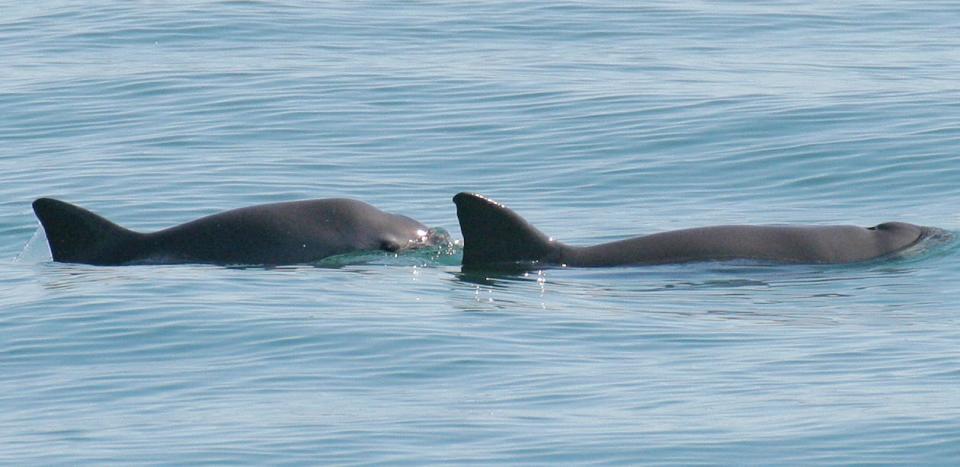'Abhorrent': Environmentalists call out Mexican company over use of endangered fish
A Mexican startup using an endangered species of fish in some of its products is under fire as environmental groups say the company is violating an international trade agreement.
The Mexican company, The Blue Formula, says its anti-aging collagen supplement of the same name is made of “100% sustainable totoaba fish extract” and other ingredients. The totoaba fish, found in the Gulf of California in Mexico, was listed as endangered by the National Marine Fisheries Service in 1979.
The Center for Biological Diversity, the Animal Welfare Institute and the Natural Resources Defense Council on Thursday wrote a letter condemning the use of the totoaba and questioning the legality of its exportation.
Environmentalists send letter about The Blue Company
The environmental groups sent their letter about the The Blue Company to the Convention on International Trade in Endangered Species of Wild Fauna and Flora, or CITES, which is in charge of an agreement between governments to make sure international trade doesn’t hurt the survival of covered species.
In the letter, the agencies argue that The Blue Formula violates the agreement by trading totoaba internationally because their product ships to China and the United States, according to the company's website, which says its collagen supplements lead to better skin moisture, improved elasticity and fewer wrinkles.
“We urge you to inform Mexico about this violation and to rapidly initiate CITES-compliance procedures if Mexico fails to immediately halt export of these totoaba products through domestic enforcement action,” the letter reads.
The agencies have heard nothing from CITES beyond confirmation that they've received the letter, according to Sarah Uhlemann of the Center for Biological Diversity.
CITES did not immediately respond to USA TODAY’s requests for comment
Mexican startup says its practices are legal
In a statement to USA TODAY, The Blue Formula said its practices are legal both nationally and internationally, and that they've worked with a scientific research foundation that hopes to breed, fatten and repopulate the totoaba in the Gulf of California.
“Our most significant environmental contribution is the repopulation of the totoaba through releases of fry (small totoabas) into the Gulf of California, preserving the delicate balance of our oceans for future generations,” the company said.
The Blue Formula also said “it is a product exclusively sold in Mexico, and purchasing it for resale outside the country is the responsibility of the buyer.”
“We will continue to work transparently and legally, holding the necessary certifications and permits to confirm that our operation fully complies with legal standards and sustainable practices,” The Blue Formula wrote.
Company has not followed proper permit protocol, environmental agency says
The Blue Formula is shipping products containing totoaba internationally but the company hasn't said whether or not their products contain swim bladders, the part of the fish that contains collagen and the main reason they're so in demand. (They're sold on the Chinese black market, according to Smithsonian Ocean.)
The company's silence on whether it's using swim bladders is what's concerning Kristin Nowell, chief executive officer of the Cetacean Action Treasury, a nonprofit working to prevent a marine mammal known as the vaquita from going extinct.
Nowell knows of one Mexican totoaba farm that has obtained the proper permit to export the endangered species minus its swim bladder. But The Blue Formula worked with a different farm to make their products and didn’t get international export permission, she said.
“Totoaba swim bladders are the whole crux of organized crime, totoaba poaching, the key to extinction,” Nowell said.
What are vaquitas and what do they have to do with totoabas?

Nowell said her agency and others are trying to save the vaquita, a porpoise species native to the Gulf of California in Baja California. There are possibly 10 of them left, she said.
Local fishermen often use large nets called gill nets to catch totoaba versus hook-and-line methods, she said. According to the Porpoise Conservation Society, vaquitas can get caught in these nets, as well.
“From our perspective, the real problem is the use of these big, illegal nets to poach totoabas for their swim bladders,” she said. “If the local fishermen didn't use big nets to catch them and used the traditional method of hook and line instead, the vaquita would be completely separate from the totoaba issue.”
The illegal trade of totoaba in Mexico "has pushed the vaquita porpoise to the edge of extinction,” said Zak Smith, a senior attorney and director of global biodiversity conservation at the Natural Resources Defense Council.
“Given the perilous status of the vaquita, enforcement authorities must closely monitor trade in totoaba-based products and stamp out anything that is illegal," Smith said.
Environmentalists push Amazon to make changes, too
The agencies who wrote to CITES also noted that The Blue Formula is sold on Amazon, which listed The Blue Formula as unavailable on Friday but by Monday it was available for purchase again, according to a spokesperson with the Animal Welfare Institute.
Selling products made with an endangered species is "abhorrent," said DJ Schubert, senior scientist in wildlife biology at the Animal Welfare Institute.
“Mexico must act to ban such sales immediately as required by CITES,” Schubert said.
“We call on Amazon and any other seller to immediately pull this product – and any others manufactured from endangered species – since hawking this merchandise could incentivize the poaching of wild totoaba, further threatening the critically endangered vaquita porpoise.”
This article originally appeared on USA TODAY: Mexico's The Blue Company called out for use of endangered fish

